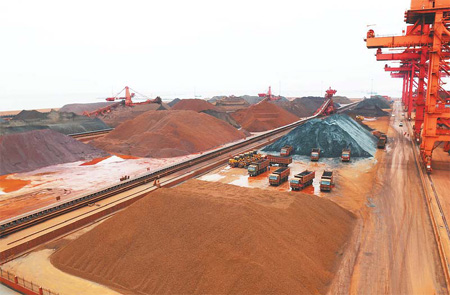Ore Imports Set to Slump at Key Port
Adjust font size:
Iron ore imports into one of China's main ports are set to slump by up to 50 percent over the next few months in the wake of events surrounding the Rio Tinto affair, according to a leading official.
 |
|
Iron ore stocked at Rizhao port in Shandong Province. [China Daily] |
The severe drop is the first real evidence of the impact of the inability of the China steelmakers to reach an agreement over the benchmark ore price with the major iron ore producers, led by Rio.
"Chinese steel mills have since reduced orders from global miners at annual negotiation price and turned to the rising international spot price for imports -- which now stands 7 percent higher than the price Japanese and South Korean steelmakers settled for in May," said Zang Dongsheng, vice general manager at Rizhao Port Group.
China's iron ore imports soared 46 percent from last June, reaching 55.29 million and up 3.4 percent over May, according to statistics released by China's General Administration of Customs.
As a result, imports into Rizhao Port in Shandong province, China's largest iron ore port which accounts for a fifth of all deliveries, are set to fall by 40 percent in August and 50 percent in September compared to the average level in the first six months of this year, according to information gathered by the port from its 68 steel mills, including Baosteel Group and 30 steel trading customers.
"Chinese steel mills started to reduce orders in May when the China Iron and Steel Association rejected the 33-percent cut (offered by miners) and held out for more discount," he said. "As the shipments to China will be two or three months delayed from Australia and Brazil, so the drop will be seen in August and September."
There is also evidence of the Chinese steelmakers turning their back on Australian imports and switching to Brazilian ore instead.
Zang said there now also seems to be a backlash against Rio iron ore imports among China steel companies, with his customers opting to buy from Brazilian company Vale instead. Last year, more than 30 percent of the port's iron came from Australia and around 40 percent from Brazil.
"Since the Rio Tinto scandal, customers have reduced their orders from Australia and are turning to Brazil. Although it is difficult now to quantify the precise figures, they will be available in September," he said.
Zang said the wrangling over setting the price has impacted the level of imports.
"In the last 40 days, the spot price has increased by 20 percent and it has become difficult to predict how much it will increase in August and September, but it may be by 20 percent again. This has affected volume," he said.
He also said Chinese steelmakers were not buying as much because 100 million tons of ore stock had been built up at the steel mills and the port.
